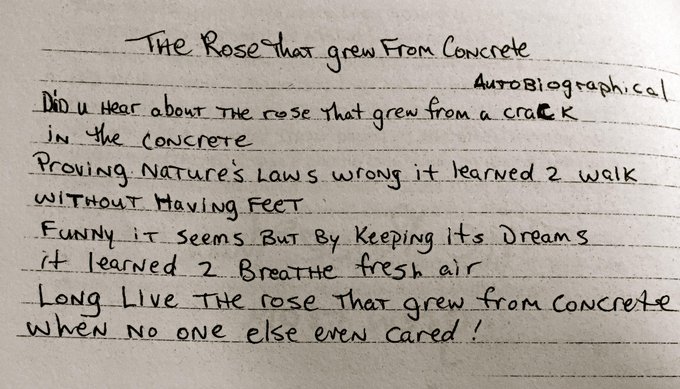The Rose That Grew From Concrete
A thank you note can be a simple gesture, but it can also be a powerful expression of gratitude that can have a lasting impact. In the case of Maya Angelou's letter to Tupac Shakur, it was not just a token of appreciation, but a message of hope and encouragement that changed the course of Tupac's life and career.
Maya Angelou was a celebrated writer, poet, and civil rights activist who inspired and touched the hearts of millions of people around the world. Tupac Shakur, a rapper, actor, and activist, was known for his honest and powerful lyrics, which resonated with people, particularly in the African American community.
In 1990, Tupac sent Maya Angelou a copy of his poetry, along with a letter expressing his admiration for her work and asking for feedback. He wrote, "I have read some of your poetry, and I am truly inspired. I would be honored if you would read some of my poetry and tell me what you think. Sincerely, Tupac Shakur."
Maya Angelou was deeply moved by Tupac's letter and his poetry, which she saw as a reflection of his struggles to find his voice in a world that often silenced the voices of people of color. She saw in Tupac a kindred spirit, a young man who was seeking guidance, inspiration, and validation from someone he admired and respected.
Maya Angelou responded to Tupac's letter with a heartfelt note, which expressed her admiration for his spirit, talent, and courage. She wrote, "Dear Tupac, your poem 'The Rose That Grew From Concrete' moved me deeply, and I think it shows the depth of your soul. I offer you my support and encouragement, and I hope that you will continue to pursue your dreams. With admiration and respect, Maya Angelou."
Maya Angelou's letter was a powerful affirmation of Tupac's voice, vision, and talent. It was a letter of hope and love that showed Tupac that he was not alone in his struggles, and that there were people who believed in him and his message. Tupac later said in an interview, "Maya Angelou's letter changed my life. It gave me the confidence and inspiration to keep going, to keep writing, and to keep fighting for what I believe in."
In her letter, Maya Angelou also offered Tupac some advice, reminding him of his responsibility to speak truth to power, to challenge the status quo, and to fight for justice and equality. Tupac took her words to heart and used his music and voice to speak out against racism, poverty, police brutality, and other social injustices.
Tupac's poem, "The Rose That Grew From Concrete," which he sent to Maya Angelou, was a poignant reflection of his own struggles and resilience.

Tupac's poem was a testament to his strength and determination, as well as to the resilience and beauty of the human spirit. Maya Angelou's response to Tupac's poetry was a testament to the power of gratitude, empathy, and compassion to inspire, uplift, and heal.
Maya Angelou's letter to Tupac Shakur was a beautiful example of the power of empathy, encouragement, and love. It was a letter that showed the importance of reaching out to others with compassion, especially in times of struggle and adversity. Tupac's poetry and Maya Angelou's response were both reflections of the strength and beauty of the human spirit, which has the power to overcome even the harshest circumstances.
